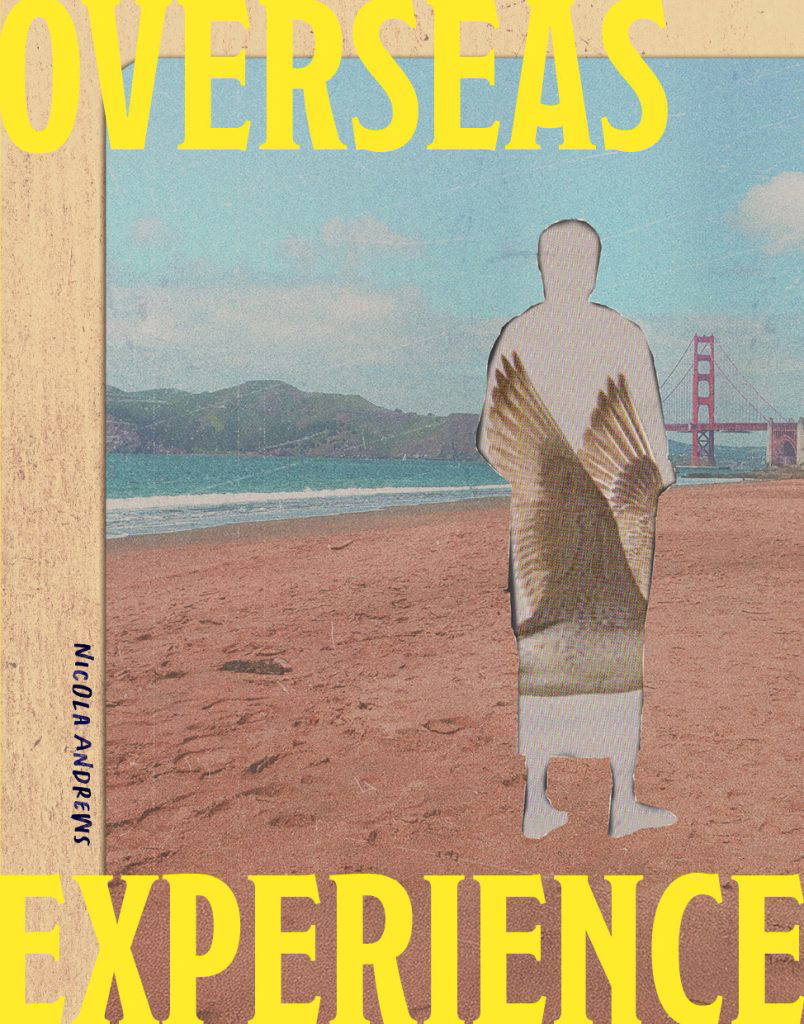Overseas Experience
Overseas Experience by Nicola Andrews. Āporo Press (2025). RRP: $30. PB, 92 pp. ISBN: 9780473745677. Reviewed by Melissa Oliver.
It can sometimes be hard, when a work of art holds a light up to your deep insecurities, to look at it objectively. But in Overseas Experience, Nicola Andrews takes your hand and doesn’t let go as she guides you through the collection. Andrews writes from two cities, San Francisco and Tāmaki Makaurau, with Te Moana-nui-a-Kiwa stretching between them. This collection finds homes for itself in all three places, putting down roots and creating a bridge across. As modern Māori, what do our stories and journeys look like?
The two places and the liminal in-between of the moana provide the framework of Overseas Experience. The poems are set firmly against the backdrop of the speaker’s new home, San Francisco, and, throughout, move towards Aotearoa, back to another home.
The collection is divided in two with the first section, ‘Overseas,’ settling into the experience of living away from the whenua that holds who the poet is. In the first poem of the collection, ‘Left on Read,’ the opening stanza is a brilliant introduction to the kaupapa that weaves through the book:
‘Well well well.
Well here I am
on the wrong damn side
of Te Moana-nui-a-Kiwa,
writing my kupu iti—little words—
on Ramaytush Ohlone
whenua.’
What does one do when they feel disconnected? When they feel like ‘a crap Māori’ (‘Left on Read’)? What does it mean to feel this whakamā?
This section carries whakamā on every page but also a great determination and fierceness to write about that experience from across the ocean: Jeff Bezos names his superyacht ‘Koru,’ kuaka make their journey to Alaska, Dr. Ropata learns Español on Guatemalan evenings, ‘flashes / of tā moko that emerge under seams and hemlines’ (‘Departure Lounge’). Glimpses of home will find you.
The second half is titled ‘Experience,’ and is imbued with embracing the fullness of what it might mean to accept yourself as Māori and how that can allow you the fullness of who you are. This section reaches back into memory and whakapapa to pull forward its poems: school holidays stretch out, LAND BACK is reiterated over and over, language is lost and regained, the dictionary app is consulted.
‘Experience’ settles a little more into the internal life of the poet. An example of this is in ‘Island Time,’ which I consider a stand-out poem from the collection: ‘Where I come from, Father Time answers to the tides. I claw back my kupu and hope / full sentences surface before our eroded islands embrace the sea.’
How good! Using the clock imagery that appears throughout, imagery of pūrākau and that liminal space of the ocean established at the start of the collection. The poet does an excellent job of keeping the collection cohesive; themes are re-iterated and re-interpreted. I do wonder if some time has passed between the first and second sections, as in the second it seems the voice of the poet has matured. This collection brings together works previously published in two chapbooks, Hinting at Decolonisation and Māori Maid Difficult, as well as some new poems.
At times, there are poems that get lost in the conversation, perhaps because they attempt to sound like or speak similarly to the style of poets they are responding to. The most clear example is the poem, ‘I Didn’t Come Here to Make F.R.I.E.N.D.S (except for Hera Lindsay Bird and Tim Grgec)’ but others echo other contemporary poets’ styles, making the text feel forced into being rather than flowing naturally like others in the book, such as the above ‘Island Time.’
Andrews and Āporo Press have made an interesting choice in the layout of the book at the end of the ‘Overseas’ section, as it moves toward ‘Experience’ and through that liminal space across the ocean. In the poems that take place in airport lounges and on flights returning home, the orientation of the page changes and the reader has to turn the book to continue reading. In elongating the experience, it creates that movement of travelling towards something, in this case Aotearoa. This is a very clever design choice and one that works with the poetry.
It’s rewarding when a poet puts on the page the ways you’ve experienced the world. When you can trust that the poet gets it, when they know about the enough-ness and the whakamā, something pretty special happens for the reader. Overseas Experience is a poetry collection that covers a lot of ground, always in conversation with itself, with its tūpuna, with what it means to be Māori in this modern world, and how we get by as modern Māori, reclaiming what is ours.
Melissa Oliver (Ngāti Porou) is a bookseller, reader and writer based in Te Whanganui-a-Tara, originally from Te Matau-a-Māui.
